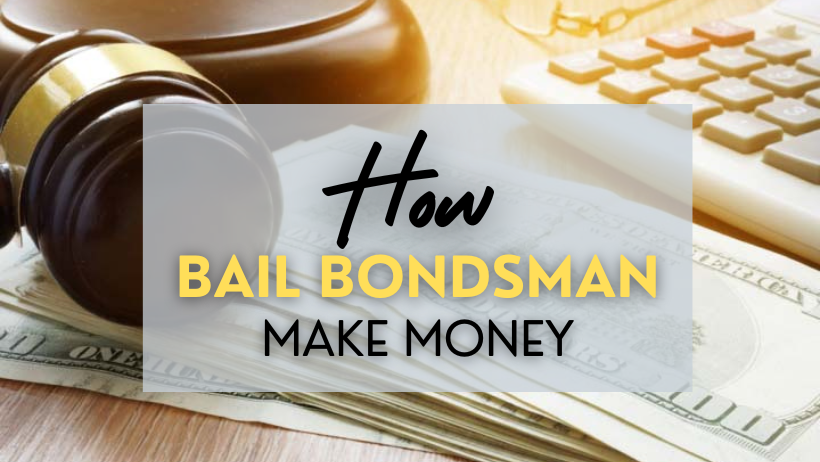How Bail Bondsman Make Their Money: Explore the intriguing world of bail bondsmen and uncover the secrets behind their financial success. Discover how they navigate the bail system, leverage their expertise, and capitalize on their unique business model to earn substantial profits.
Introduction to How Bail Bondsman Make Their Money
The enigmatic world of bail bondsmen holds many secrets when it comes to making money. These individuals operate behind the scenes, connecting defendants awaiting trial with temporary freedom.
Have you ever wondered how bail bondsmen manage to make their money? In this article, we will take an in-depth look into the financial workings of the bail bonds industry and shed light on the lucrative nature of their business. Get ready to uncover the secrets of “Behind Bars and Bankrolls: How Bail Bondsmen Make Their Money.”
How Bail Bondsman Make Their Money

Behind Bars and Bankrolls: The Basics of Bail Bonds
To understand the financial aspects, let’s start with the fundamental concept of bail bonds. When someone is arrested and faces criminal charges, they may have the option to post bail—a monetary amount that serves as a guarantee of their appearance in court. However, the full bail amount is often too high for defendants to pay upfront. This is where bail bondsmen come into play.
The Role of Bail Bondsmen: From Jail Cells to Courtrooms
Bail bondsmen act as intermediaries, providing defendants with a way to secure their release. They charge a non-refundable fee, known as a premium, which is a percentage of the total bail amount. In return for this fee, the bondsman issues a bail bond—a legal document that ensures the defendant’s presence in court.
The Profit-Making Mechanisms of Bail Bondsmen
Now, let’s delve into the mechanisms that enable bail bondsmen to generate substantial profits.
1. Premiums: The Financial Core
The primary source of income for bail bondsmen lies in the premiums they charge their clients. Typically, the premium amounts to 10% of the total bail. For example, if the bail amount is $10,000, the defendant would pay a $1,000 premium to the bail bondsman. This premium forms the financial core of their business.
2. Collateral: Protecting Investments
In some cases, defendants are required to provide collateral as an additional layer of security for the bail bondsmen. Collateral can come in various forms, such as real estate, vehicles, or valuable assets. If the defendant fails to appear in court, the bail bondsman can seize the collateral to cover their losses.
3. Skip Tracing: Navigating the Unknown
Bail bondsmen must navigate through uncertainty when dealing with defendants who evade court appearances. This process, known as skip tracing, involves tracking down fugitives and bringing them back into the grasp of the criminal justice system. By successfully apprehending those who abscond, bail bondsmen can claim a substantial bounty, often a percentage of the total bail amount.
4. Volume and Efficiency: Working the Numbers
In the bail bonds world, volume is key. Bail bondsmen strive to process a high number of clients, leveraging their efficiency to maximize profits. By streamlining administrative processes and working closely with law enforcement, they can handle multiple cases simultaneously, increasing their revenue streams.
5. Collaborations with Attorneys: A Profitable Partnership
Building strong relationships with defense attorneys can be highly beneficial for bail bondsmen. Attorneys often refer their clients to trusted bail bondsmen, resulting in a steady flow of business. In return, bail bondsmen may offer financial incentives to attorneys, further strengthening their partnership.
6. Diversification Strategies: Expanding Beyond Bail Bonds
Some bail bondsmen have expanded their services beyond the realm of bail bonds to diversify their income. They may offer additional services, such as private investigations or security consulting, capitalizing on their expertise and venturing into related industries.
Frequently Asked Questions (FAQs)
- Q: Are bail bondsmen operating legally?
- A: Yes, bail bondsmen operate within the bounds of the law and play a vital role in the criminal justice system.
- Q: What happens if a defendant fails to appear in court?
- A: If a defendant skips bail and fails to appear in court, the bail bondsman may employ skip tracing techniques to locate and apprehend them. They can also invoke the collateral provided by the defendant to cover their losses.
- Q: Are premium rates regulated?
- A: Premium rates can vary depending on the state and jurisdiction. Some states have regulated rates, while others allow bail bondsmen to set their own premiums within legal limits.
- Q: Can defendants negotiate the premium rate?
- A: In most cases, the premium rate is non-negotiable, as it is based on a percentage of the total bail amount.
- Q: What happens to the premium if the defendant is found innocent?
- A: The premium paid to the bail bondsman is non-refundable, regardless of the defendant’s innocence or guilt. It serves as compensation for the services rendered.
- Q: Can defendants choose any bail bondsman?
- A: Defendants have the freedom to choose their bail bondsman, but they must find one who operates within the jurisdiction of their arrest.
Conclusion How Bail Bondsman Make Their Money
Bail bondsmen operate in a mysterious world, bridging the gap between defendants and their temporary freedom. Behind the scenes, they employ various strategies to generate substantial profits.
Through premiums, collateral, skip tracing, efficiency, attorney collaborations, and diversification, bail bondsmen have created a lucrative industry within the realm of “Behind Bars and Bankrolls: How Bail Bondsmen Make Their Money.” Now, you have a deeper understanding of the financial mechanisms that drive their success.
Also Read:
How to Make Money in GTA 5 Online

1 thought on “Behind Bars and Bankrolls: How Bail Bondsman Make Their Money | 2023”